Title: MSFS Legacy for the Future: Mohammed Soliman (MSFS ‘19)
This story is part of our MSFS Legacy for the Future series profiling members of the MSFS community who have made, or are poised to make, important contributions to international affairs. Through our Legacy for the Future campaign, you can support MSFS scholarships for talented students and ensure that the leaders and innovators of the future are given the skills and opportunities they need to meet the global challenges of tomorrow, today. Make your contribution to MSFS Legacy for the Future now.
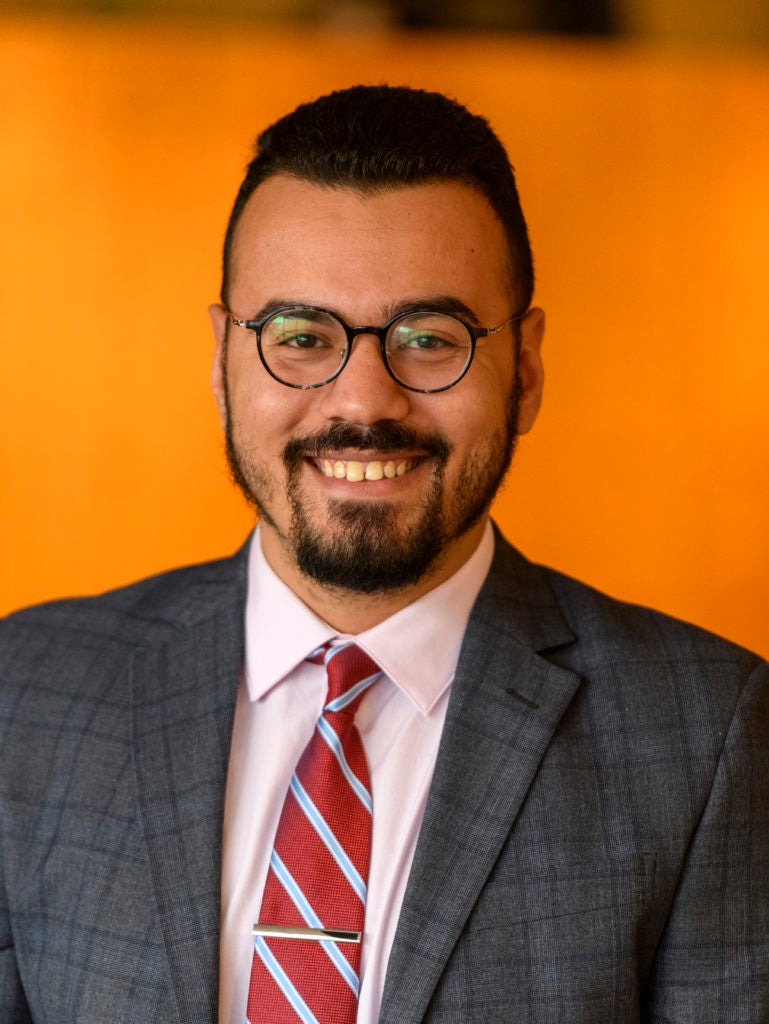
When describing the early days of the 2011 Egyptian revolution, the first thing Mohammed Soliman (MSFS ‘19) mentions is the media blackout. As a student activist on the ground, Mohammed knew how important media exposure was to promoting the demands of the demonstrators taking to Egypt’s streets to protest the police brutality, crackdown on civil liberties, and economic stagnation that had come to define Hosni Mubarak’s presidency. So, as soon as the blackout was enforced, Mohammed and other protest leaders quickly began working on ways to circumvent it. “Those five or six days of blackout were crucial,” he remembers. “We began to contact people we knew at the big tech companies, friends, family, and colleagues, who could tell us how to get around the blackout.”
The blackout not only curtailed activists’ ability to communicate their own actions, it also kept them in the dark about other similar protests happening across the Middle East. After government forces used tear gas and deadly police violence against Cairo demonstrators in February 2011, a European journalist reached out to Mohammed for comment. It was the first time Mohammed became aware of the scope of the political unrest that had swept across the Middle East in a matter of days. “He [the journalist] calls me and asks me, ‘What do you think about the Arab Spring?’” Mohammed remembers. “I was like, ‘What’s the Arab Spring?’ He said, ‘What’s happening is the Arab Spring!’”
The term “Arab Spring” still irks Mohammed. He argues that it fails to capture the specificities of the diverse political movements that gained traction across the Middle East in 2011 by contextualizing them within a European frame of reference. “The Western media came up with this term ‘Arab Spring’. You know, like ‘Prague Spring.’ Even the terms they were using to describe what was happening in the Middle East were not authentic.”
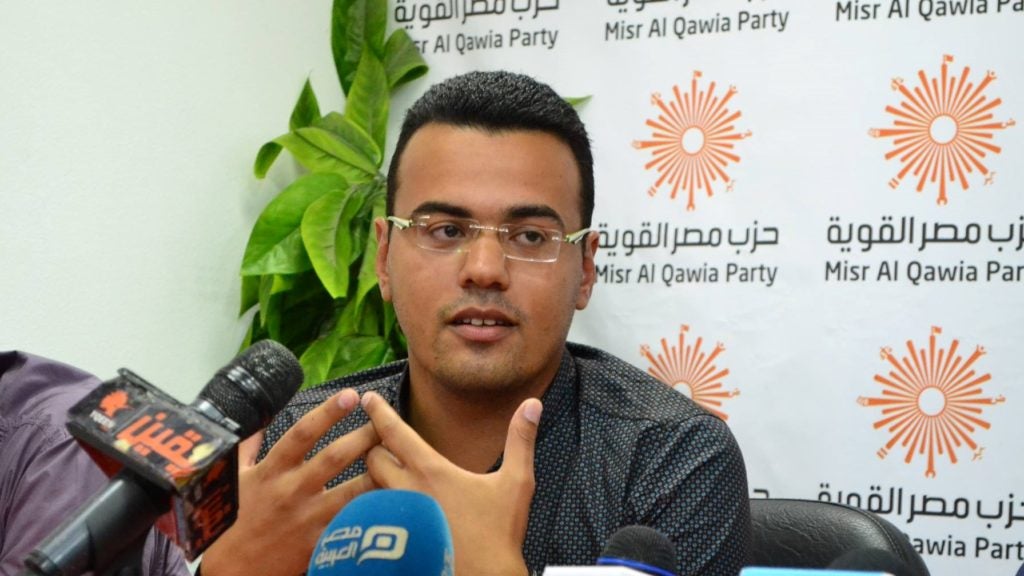
Soon after that journalist’s call, Mohammed became a voice for the new ideas and desires of many of the Revolution’s demonstrators. In addition to pursuing an engineering degree, he worked as a reporter at Tahrir News and, as the youngest political officer for the Constitutional Party of Egypt, major Egyptian and international news channels regularly called on him to provide commentary. Initially, his journalistic work was an extension of his activism and he strove to express the hopes and concerns of ordinary Egyptian through his media appearances. However, as he began to cover a broader range of stories, he increasingly understood the need to separate his journalism from his political activism. “When I really started to work professionally, I had to learn how to report on lots of different kinds of people I disagreed with,” he says. “I had to differentiate between objective commentary and my street activism.”
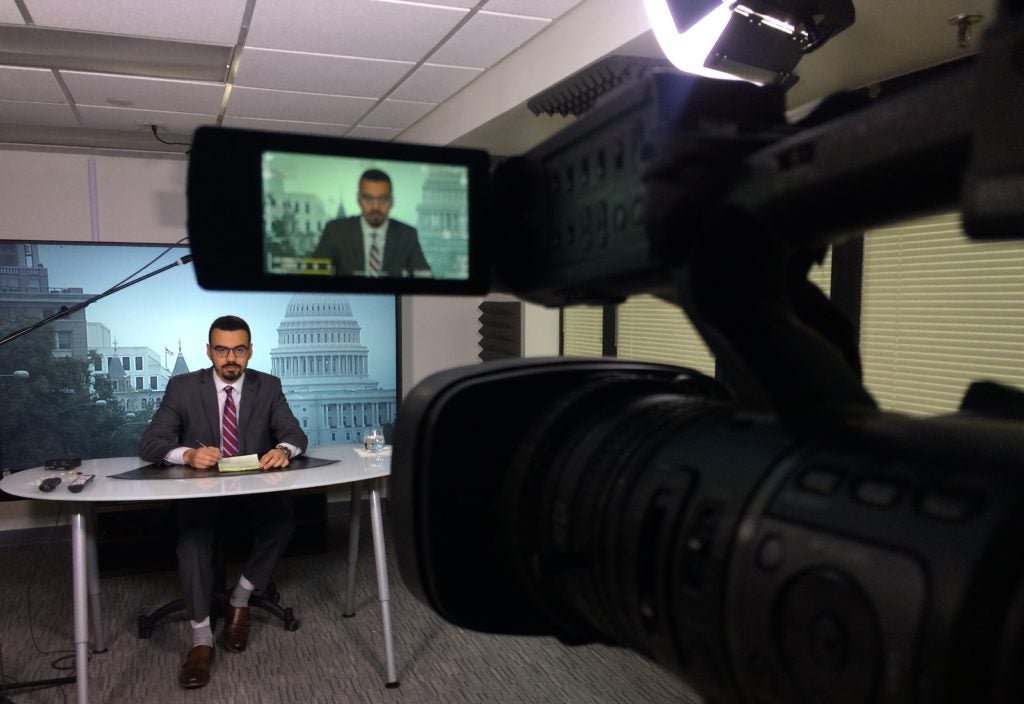
Today, Mohammed has covered Egyptian and Middle Eastern affairs for a number of outlets including Egyptian newspaper Tahrir News, D.C.-based international affairs publication Foreign Affairs, Sky News Arabia, and Italian newspaper La Stampa. He aims to provide a more nuanced and accurate representation of Middle Eastern society, which he finds lacking in coverage by many of the larger, Western media channels. “You read a story in these big outlets and you think, I have no clue how that writer came to that conclusion,” he explains. “You have titles like ‘To understand the Middle East, you have to understand the food culture.’ What does that mean? The priorities of Western society are projected on to the Middle East, but we have our own issues that are different.”
His dedication to improving how the Middle East is understood in international policy and media circles led Mohammed to Washington, D.C. “I wanted to live in D.C. and be part of D.C. circles because this is where all the policies related to my region come from,” he explains. He first visited Georgetown’s School of Foreign Service in 2014 and immediately knew that he wanted to study at MSFS. The variety of classes, the diverse international experience of the program’s students, as well as the program’s D.C. location appealed to Mohammed. With funding from the Civil Society Leadership Awards from the Open Society Foundation, he was able to enroll as an MSFS student in August 2017.
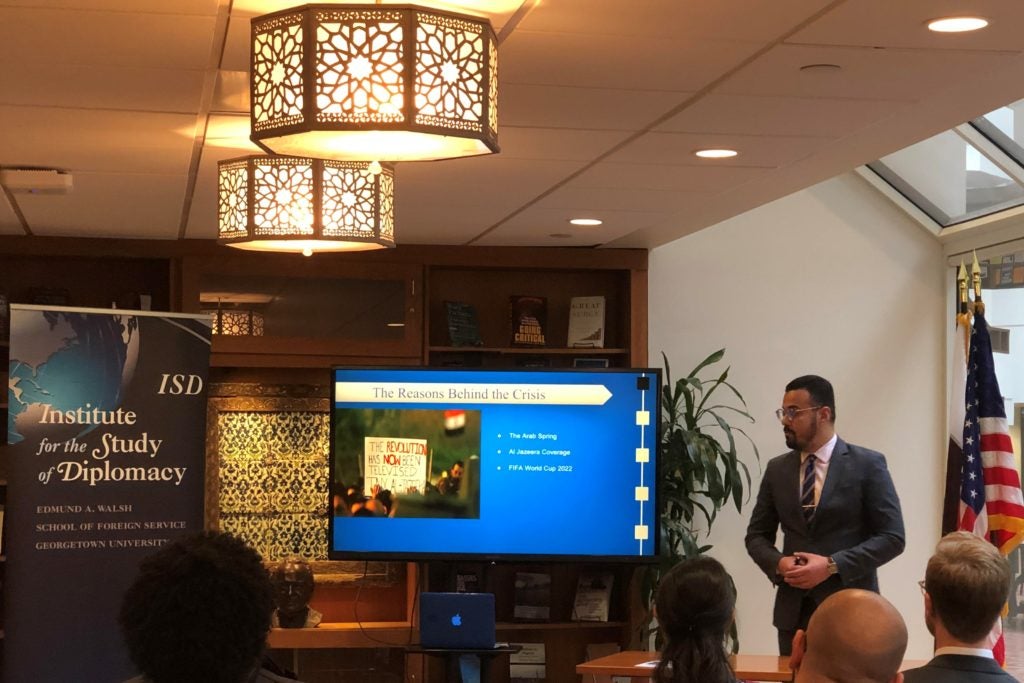
At MSFS, Mohammed was selected as a Huffington Graduate Fellow at the Institute for the Study of Diplomacy, where he conducted research on how the Gulf Crisis affected U.S. policy toward Iran. He also served as Co-Chair of the Middle East and North Africa (MENA) Forum, a student group committed to raising awareness about pressing issues in the MENA region. Under Mohammed’s leadership, the organization hosted a number of prominent figures from the region, including Former Prime Minister of Palestine Salam Fayyad and Former Foreign Minister of Jordan Marwan Muasher.
Mohammed’s deep passion for understanding how media and reporting can influence global societies motivated him to use his time at MSFS to pivot to a new career. While he continued to provide commentary on current affairs in the Middle East for various media outlets, his academic work increasingly focused on how technology is changing the way media influences international politics. At MSFS, he took a course titled “Hacking for Defense,” where he explored how to use social media to create situational awareness for on-the-ground troops. And during the summer between his first and second year, Mohammed interned at GroundTruth Global at the PeaceTech Lab. The organization uses data, media, and tech to identify early social and economic disruptions in fragile and emerging economies.
These experiences enabled him to pursue a career working at the intersection of technology and geopolitics, a field he says is at the new frontier of international affairs. “Everything is transnational, everything is connected,” he explains. “Hacking, cybersecurity, big data, big tech: these are the things that are shaping the international world right now.” Understanding how both state and non-state actors can use technology to spread disinformation is vital to creating informed societies, he says: “Understanding how technology—like bots and algorithms—makes it easy to manipulate the information we are exposed to is important to countering ‘fake news’.”
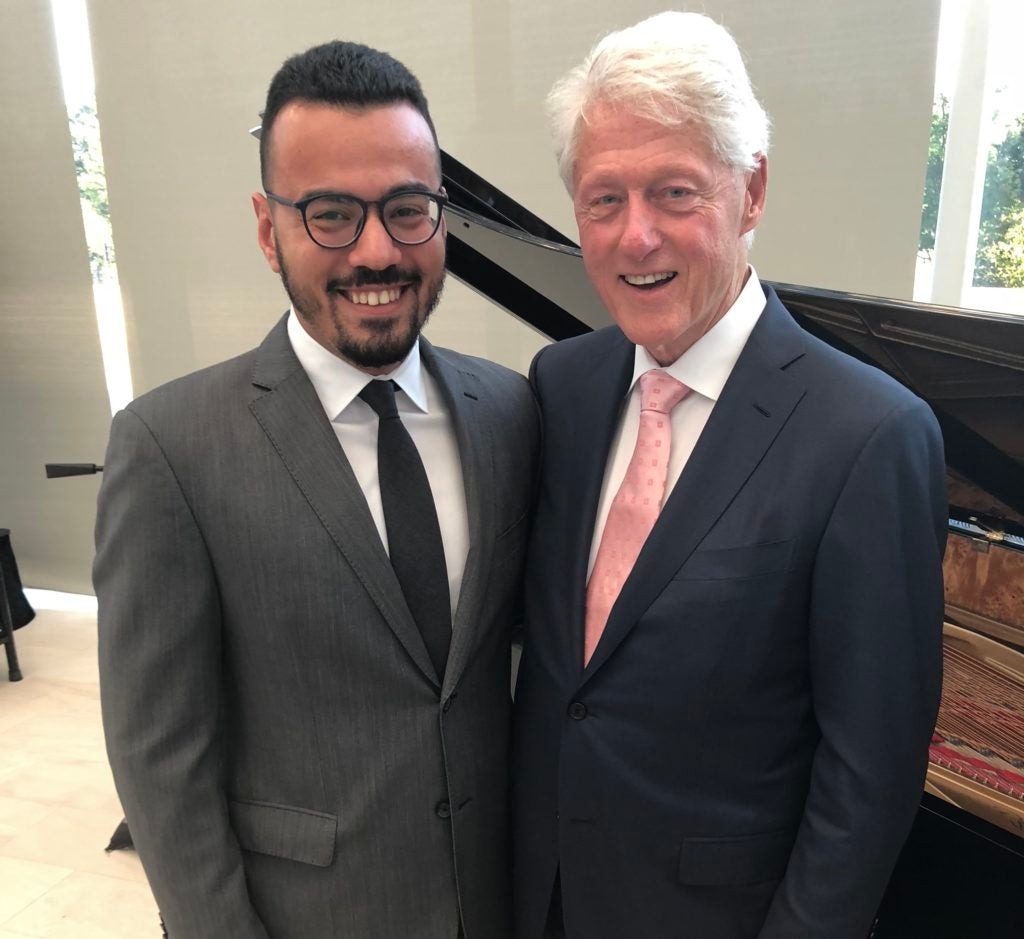
Since graduating in May, Mohammed has accepted positions as a Non-Resident Scholar at the Middle East Institute—a D.C.-based think tank focusing on the Middle East—and a Graduate Fellow at McLarty Associates, a firm that helps private sector clients navigate policy and government issues around the world. The positions allow him to combine his regional focus with the technological and analytical skills he gained at MSFS. “I’m proud of the fact that in my post-graduation professional life, I’m using my training as an engineer, my experience as a Middle East analyst, and my graduate-level courses on cyber, tech, trade, and finance to add value across different functions for clients operating in the Middle East and North Africa (MENA) region,” he says. “The MENA region is a pristine emerging market, where I help clients at the nexus of business and policy and navigate complex strategic and operational challenges.” In addition to his work at McLarty and the Middle East Institute, Mohammed is continuing to build up his academic experiences. “Being immersed in the world of global consulting has not diverted me from policy and academia,” he says. “I’m contributing a chapter to an upcoming Middle East Institute book on cyber policy in the Middle East!”
As he continues to build his career, Mohammed is reflecting on how much his life has changed since the Revolution. “If you look at me when I was 19 years old and now in 2019, I’m two completely different people,” he says. “The exposure to new networks and ideas has changed how I think about things.” He credits much of this transformation to his time at MSFS and to the OSF scholarship that enabled him to attend the program. Mohammed is keenly aware of how important scholarships are to students like him, who have important ideas and contributions to make to the world of international affairs. “I’m not from a wealthy family. I went to public schools and didn’t get many formal English classes. People like me do not really go to Georgetown,” he explains. “Going to MSFS gave me the tools I needed to be where I wanted to be. I came to Georgetown to learn how I can serve because I believe in the MSFS value of service. MSFS captures what I aspire to be.”
Support more students like Mohammed Soliman to attend MSFS. Donate to our MSFS Legacy for the Future campaign today.